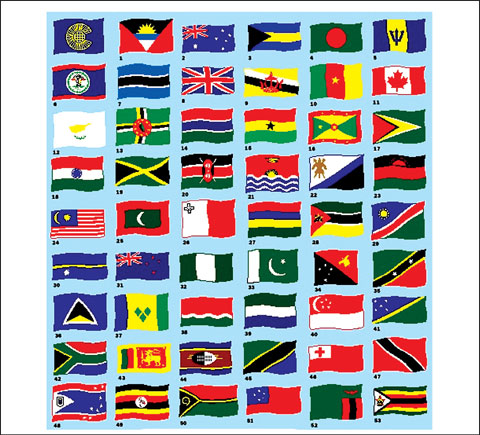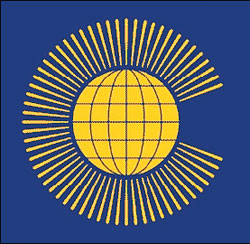The Commonwealth of Nations
Prof. Amal Jayawardane
The Commonwealth is a voluntary association of 54 independent states
located in six geographical regions: Africa, Asia, the Americas, the
Caribbean, Europe and the South Pacific. At present almost two billion
people, or about 30% of the world's population, live in the
Commonwealth.
 The Modern Commonwealth began to evolve since the adoption of the
London Declaration in 1949; however, its historical roots can be traced
back to the late nineteenth century. Those colonies which achieved
dominion status in the British Empire such as Canada (1867), Australia
(1901, New Zealand (1907), and South Africa (1910) expressed their
desire to evolve a new institutional structure to reshape their
relationship with Britain. The Imperial Conference in 1926 adopted the
Balfour Declaration which said that Britain and its dominions agreed
that they were “equal in status, in no way subordinate one to another in
any aspect of their domestic or external affairs, though united by
common allegiance to the crown, and freely associated as members of the
British Commonwealth of nations.” The Modern Commonwealth began to evolve since the adoption of the
London Declaration in 1949; however, its historical roots can be traced
back to the late nineteenth century. Those colonies which achieved
dominion status in the British Empire such as Canada (1867), Australia
(1901, New Zealand (1907), and South Africa (1910) expressed their
desire to evolve a new institutional structure to reshape their
relationship with Britain. The Imperial Conference in 1926 adopted the
Balfour Declaration which said that Britain and its dominions agreed
that they were “equal in status, in no way subordinate one to another in
any aspect of their domestic or external affairs, though united by
common allegiance to the crown, and freely associated as members of the
British Commonwealth of nations.”
After gaining Independence in 1947, India wanted to become a republic
and end its constitutional ties with the Crown while remaining within
the Commonwealth. This posed a new challenge to the Balfour criterion
which required countries to owe a common allegiance to the British
crown. This problem was successfully resolved at a conference of
Commonwealth Prime Ministers in April 1949. The London Declaration
decided to accept India's continued membership as a republic. India
agreed to accept the King as the “symbol of the free association of its
independent member nations and as such the Head of the Commonwealth.”
Subsequently the prefix “British” was dropped from the title of the
Commonwealth to signify the changing character of the organization.
Thus, the London Declaration marked the beginning of the new
Commonwealth. The Commonwealth membership has expanded from 8 in 1949 to
54 in 2009. With the decolonization movement, the newly independent
non-white and developing countries became members of the organization.
Rwanda was admitted to the Commonwealth at the 2009 Commonwealth Heads
of Government meeting. Except for Rwanda and Mozambique, all the other
commonwealth countries were part of the British empire. Through the
Commonwealth, the colonial legacy has been transformed into a new form
of partnership based on equality.
The Commonwealth represents a diverse group of nations with different
socio-economic and cultural backgrounds. However, they are committed to
promote a set of values and principles which are outlined in several
declarations: Singapore Declaration of 1971 emphasized the commitment to
world peace, representative democracy, individual liberty, equality and
opposition to racism, free trade and fight against poverty. The Lusaka
Declaration of 1979 opposed discrimination on the basis of gender. The
Langkawi Declaration of 1989 emphasized the importance of environmental
sustainability. Aso Rock Declaration of 2003 reiterated the importance
of the promotion of democracy and development. Democracy, good
governance, and human rights occupy an important place in the present
day Commonwealth discourse.
The Commonwealth is an intergovernmental organization; however, it
also promotes citizen-to-citizen links across the commonwealth. It has a
wide network of professional and advocacy organizations.
Sri Lanka and the Commonwealth

There is a longstanding bond between Sri Lanka and the Commonwealth.
Sri Lanka became a member of the Commonwealth since the very beginning
of her independence. Sri Lanka together with India and Pakistan were the
first non-white dominions in the Commonwealth. Sri Lanka was among the
eight countries which adopted the London Declaration in April 1949, and
in that sense, Sri Lanka can be considered a founding member of the New
Commonwealth
Due to the Soviet veto, Sri Lana could not gain membership in the
United Nations till the end of 1955; therefore, it was the Commonwealth
which provided an excellent opportunity for the country to be active in
the international arena. During the early days of independence when the
country did not have sufficient experience or well-developed
infrastructure for the conduct of foreign policy, Sri Lanka benefitted a
lot from the Commonwealth Relations Office (CRO) in maintaining
communications with the outside world.
The Commonwealth also figured in Sri Lanka's security calculations.
During the 1948-56 period, Sri Lanka's Prime Ministers had certain
threat perceptions about India. Since India was also a member of the
Commonwealth, it was believed that the Commonwealth connection would act
as a restraining factor on India's “strategic designs” towards Sri
Lanka. Economically also, the Commonwealth was important for Sri Lanka
as her trade relations were mostly with the country's of the Sterling
Area. The Colombo Plan was evolved as a result of the discussions that
took place at the Commonwealth Foreign Ministers meeting held in Colombo
in January 1950.
During the 1948-56 period Sri Lanka had a pro-Western foreign policy
and the country followed the “British lead” in foreign affairs. . After
1956, Sri Lanka established diplomatic relations with the socialist
countries and with the UN membership and the beginning of the nonaligned
movement, Sri Lanka's international arena was greatly widened. Sri Lanka
became less dependent on the Commonwealth. However, Sri Lanka still
considered the Commonwealth connection as an important element in its
foreign policy. Even though Mr. S.W.R.D. Bandaranaike wanted to make Sri
Lanka a Republic, he wanted to continue the country's membership in the
Commonwealth because he deeply shared the values that the Commonwealth
stood for. He said that the Commonwealth represents “ a way of life,
which includes parliamentary government, an independent judiciary, no
discrimination between the State and the citizen, and the rule of law. I
feel we should make an effort to foster this way of life, to show it to
other countries.”
Mrs. Sirimavo Bandaranaike declared Sri Lanka a Republic but
continued the country's membership in the Commonwealth. She in fact used
the Commonwealth forum to articulate some of her foreign policy
initiatives. For example, it was at the Commonwealth Conference held in
Singapore in January 1971 that Mrs. Bandaranaike first articulated her
Indian Ocean Peace Zone proposal.
All the Prime Ministers/Executive Presidents who came to power during
the post-independent period considered Sri Lanka's membership in the
Commonwealth as an important factor in the country's foreign policy.
During the last three decades Sri Lanka tried to make use of the
Commonwealth forum to emphasize the need to eliminate terrorism.
Sri Lanka has been an active participant in all the activities of the
Commonwealth. It has hosted the meetings of the Commonwealth
Parliamentary Association twice, in 1971 and 1994, and the country is
once again ready to host the 58th meeting of the CPA in September this
year.
Sri Lanka will also be the venue for the CHOGM in 2013. Other than
these activities in the political arena, Sri Lanka has also been an
active participant in other spheres such as education, culture, sports
and technical cooperation. |





